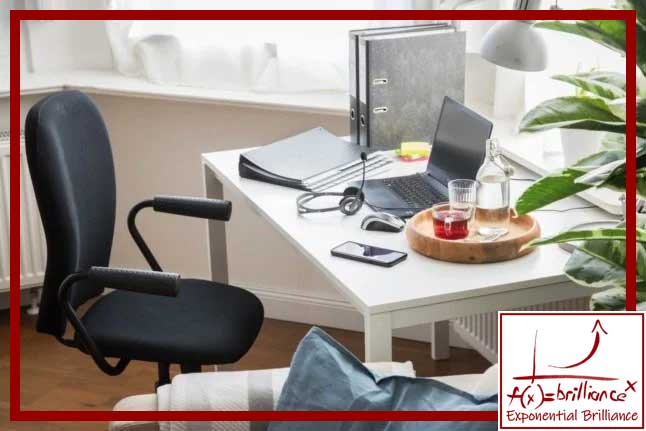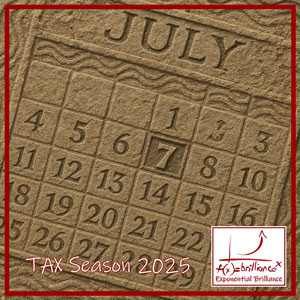2021 Tax Season and Home Office Expenses Delineated
by
 Amanda Roothman on 8 July 2021
Amanda Roothman on 8 July 2021
"In character,
in manner,
in style,
in all things...,
the supreme excellence is simplicity."
Riddle me this:
"Even though an expense may meet the requirements of Section 11 and may be excluded from the prohibition imposed by Section 23(m), home office expenditure must still escape the restrictions imposed by section 23(b)."
These are the facts.
Simplicity boils down to two steps:
- Identify the essential.
- Eliminate the rest.
Allow me to break this down.
 Tax Season 2021 is in full swing in South Africa (1 July 2021 - 23 November 2021) and as you might be aware, SARS has warned that they will only ask gently once. They have tools to move on taxpayers that refuse to play ball.
Tax Season 2021 is in full swing in South Africa (1 July 2021 - 23 November 2021) and as you might be aware, SARS has warned that they will only ask gently once. They have tools to move on taxpayers that refuse to play ball.
As I am sitting at my dining room table blogging about working from home and all that jazz, it seems like centuries ago that normal was normal. We are in month sixteen of the new normal.
SARS advised individual taxpayers to carefully consider any claim for home office expenses before filing their income tax returns.
There have been no changes to the legislation in relation to a "home office". The legal requirements remain UNCHANGED as before the pandemic. No relief measurement was allowed besides the cold hard facts:
- An office, appropriately equipped, must have been set up at the place of primary residence;
- The office must have been used regularly and exclusively for work purposes;
- The office must have been used for more than 50% of the employee's duties;
- Any home office expenses must be linked to employment use and must be verifiable; and
- Must be claimed under deduction source code 4028 on the individual tax return.
Furthermore, - Where the home office is in taxpayer owned property, taxpayers should note that this claim will have an adverse impact on a future Capital Gains determination.
I can surely say, once you do get your claim approved under source code 4028, remember the day that you sell your home.
Because SARS will not forget.
This claim will have an adverse impact on the Capital Gains Tax determination. The home office area will, on a pro-rata basis, be excluded from the primary residence exclusion (currently R2 million on disposal of the residence) - It is important to note that there is an extremely high likelihood (100%) that a taxpayer who claims home office expenses for the first time will be selected for audit verification.
Let's talk about this:
What constitutes home office expenditure?
Typically, home office expenditure includes the types of expenses referred to in Section 23(b), namely -
- Rent of premises;
- Cost of repairs to the premises; and
- Expenses in connection with the premises;
- Other types of expenses that could be incurred in maintaining a home office may include -
- Phone costs
- Internet costs
- Stationery
- Rates & taxes
- Cleaning
- Office equipment, furniture and fittings and repairs thereto
- General wear-and-tear.
The general rule in the deductibility of these expenses is determined by reference to Section 11, read with Section 23(b) and Section 23(m).
On the one hand, Section 11 serves as the positive test (as it deals with the deductions that are allowed in the determination of taxable income) and on the other hand, subsections 23(b) and 23(m) serve as the negative tests (dealing with deductions which are not allowed in the determination of taxable income).
This means that the requirements of section 11 must be met AND the prohibitions under subsections 23(b) and 23(m) must not apply.
And it goes without saying that the burden of proof lies with you, the taxpayer. Expenditure such as maintenance, rates and taxes, etc. are all good and well but the part of the home in respect of which a deduction is claimed must be occupied for the purpose of trade. (A trade includes employment and therefore employees working from home may qualify.)
The catch:
The part that is so occupied must be specifically equipped for purposes of trade and that part must be fitted with the instruments, tools and equipment required to conduct that trade. The part must be regularly and exclusively used for the purposes of the trade.
As each case will have to be decided on its own merits, it is not possible to define what would be acceptable as regular and exclusive usage for this purpose. It has been noted by SARS that a home office that is maintained and is only used occasionally for example, once a week, is not used frequent enough to constitute regular use.
Then also regarding the requirement of exclusivity, this contemplates that the part use for trade may not be used for any other than the taxpayer's trade. No deduction is permitted where the taxpayer conducts any activities of a private nature in the part used for trade. (So, taxpayers will have great difficulty satisfying the burden of proof over here!)
Let us explore some typical examples:
- Illustration 1:
Fact:
Employer allows employees to work from home 4 days per week. The remaining 1 day is reserved for meetings and/or admin duties at the employer's office.
Tom is an architect and in the employ during the 2021 tax year. For March 2020 to December 2020, Tom worked from home for 4 days a week. For January 2021 to February 2021, work required Tom to use specific equipment at the employer's premises, and so only worked from home for 1 day every alternate week.
Result:
Tom satisfies the regularity test for March 2020 - December 2020 and could qualify for a home office deduction i.r.o. expenditure for this period only.
As for January 2021 and February 2021 the regularity test was not met. Sorry Tom, you can't claim any deduction for this period. - Illustration 2:
Fact:
Annie's employer permits her to work remotely from home on a permanent basis. Annie's work entails uploading and upgrading computer software and resolving queries remotely. Annie is working from a laptop on the dining room table in the dining room.
Result:
Annie does not meet the provisions of Section 23(b) in that the home office is not used exclusively for the purpose of her employer's trade. Annie will not be entitled to any deduction in terms of home office expenditure. - Illustration 3:
Fact:
Rebecca is a tax consultant. She has a separate room that she uses as home office. This room is north-facing and Rebecca's kids attends google-classroom from time to time, and also uses this room for homework in the afternoons. I mean, it is winter in South Africa, and this is a nice sunny room, especially in the late afternoons.
Result:
Rebecca's home office is not used exclusively for purposes of her trade. Zero home office deduction is permitted. - Illustration 4
Fact:
Mia and Mike, a married couple, are both required to work from home. With effect from 1 April 2020, Mike (a lecturer) and Mia (a tailor) perform their duties mainly in a home office, which is specifically equipped for purposes of each of their trades, and regularly and exclusively used for this trade.
The area of the home office is 18 squares in relation to the entire home of 110 squares. Mia and Mike share this home office space to perform their duties.
Result:
It is a requirement that the home office be specifically equipped for purposes of the taxpayer who is claiming the deduction's trade and is exclusively used for such purpose. Since Mia and Mike share the home office space, it would mean that the office space used by Mike would not have been specifically equipped solely for his trade, but also for Mia's trade, and vice versa.
In addition, the space has not been occupied exclusively for Mike's trade, or exclusively for Mia's trade. It was partially used for both.
As such, the provisions of Section 23(b) must be applied, and neither Mia nor Mike can claim a deduction for home office expenditure.
"Sooner or later, those who win are those who think they can."
Let's talk about this. Say you do very well meet all the requirements and the mumbo jumbo illustrated above, then what?
Pro-Rata
The correct method to calculate the proportion of expenditure that a taxpayer may claim, is apportionment based on floor area of the premises. SARS has warned us that under NO circumstances will an estimate of the floor area be allowed.
The taxpayer must be in the position to prove the exact floor area of the premises and the part attributable to the home office.
The actual expenditure incurred must be determined for the months that the employee does in fact qualify for this deduction.
Permitted expenditure
- Repairs
Any repairs to the property must have some relation to the home office in order that the deduction is not prohibited.
For example, if the bathroom is repainted, or a window in the master bedroom repaired, no portion of such repair may be claimed.
If, on the other hand, the entire roof of the property has to be repaired, then the cost of such repair, apportioned based on the floor area, may be claimed as a home office deduction. - Insurance costs are generally not claimable for the following reasons.
- Bond insurance is normally a life insurance product and is specifically prohibited from being deducted, and is most likely capital in nature;
- Household insurance ordinarily relates to the contents of the premises, and not the premises itself.
- Besides the above, a whole lot of red tape exists and SARS will argue any reason why expenses are not legit for carrying on of the trade. Initial costs and monthly subscriptions for setting up a fibre installation are not expenses in connection with the premises and fall outside of what is permitted by section 23(m). The router, (normally received at no cost to the user, and who does not acquire ownership of the router until the effluxion of a period of time) does not qualify for the wear-and-tear allowance, for instance.
Capital Gains Tax consequences
The first R2 million of a capital gain or loss on the disposal of a primary residence must ordinarily be disregarded for CGT purposes. If the proceeds i.r.o. the disposal are R 2 million or less, any Capital Gain thereon must also be disregarded.
HOWEVER, if a primary residence has been used by a taxpayer partially for purposes of carrying on a trade, then -
- The primary residence exclusion of R 2 million must be apportioned for the non-residential use; and
- The R 2 million proceeds rule for disregarding any capital gain, does not apply to the part of the premises used for the purpose of the trade.
- The business portion will be fully subject to Capital Gains Tax.
- If more than 50% of the property is used for trade, the property will not be defined as primary residence.
- Capital Gains Tax on the business portion of the gain, whether or not the taxpayer claimed, or was entitled to claim, a deduction against income i.r.o. home office expenses.

With all the above being considered, you may despair.
But don't.
You have your #TaxDivas of #TeamExponentialBrilliance on your side.
It goes without saying that we are still determined to provide our clients with a delightful experience this tax season, and with our uniquely designed Exponential Brilliance Swift Application, we will leave a memorable impression on you.
We are still passionate about client satisfaction.
Excellence is, therefore, not an act, but a habit.
⚙️ Knowing Where to Tap: 🔨 The Brilliance Behind Precision
✨ A story about insight, experience, and collaboration....
by Amanda Roothman on 10 October 2025



